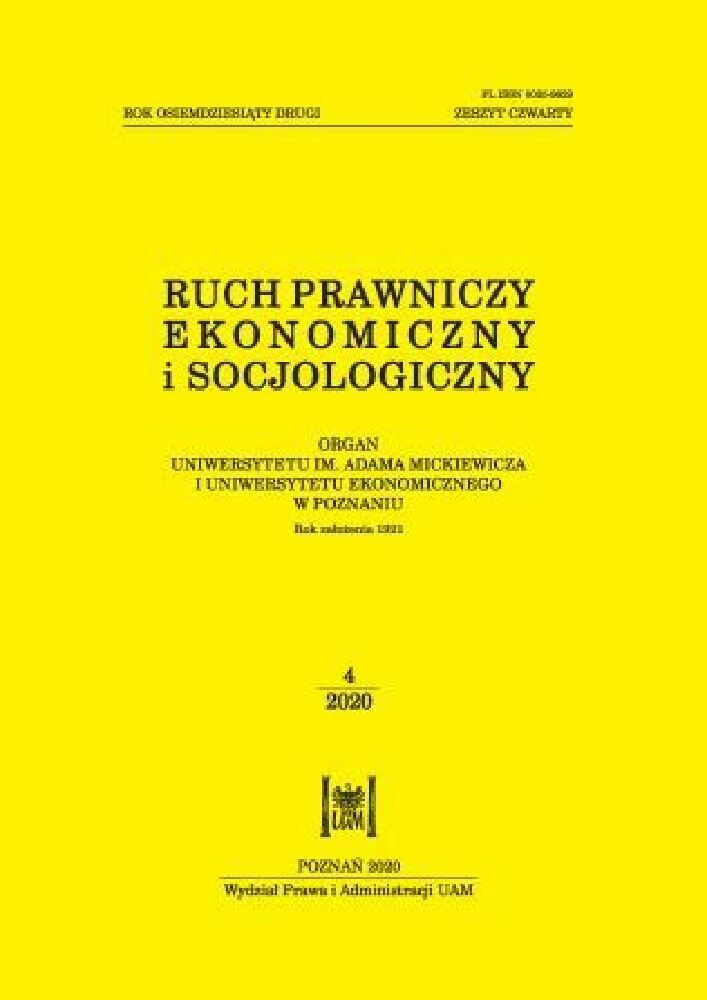Abstract
The article presents the legal environment in which local self-governments may operate. The author seeks to demonstrate that such an environment can be one characteristic for the decentralization of public administration, understood as independence in the field of law application, without simultaneous independence in the field of law-making that is equal to the rank of an ordinary act. However, in the author’s opinion, a local self-government may also function autonomously, which involves independence not only in the application of the law, but also in adopting acts with the rank of an ordinary act, as was the case in the Silesian Voivodeship in the times of the Second Polish Republic, and as found today in the Italian Republic and the Kingdom of Spain. Finally, local self-government can also function under conditions of quasi-autonomy. The author suggests that in this case individual units of local self-government have been directly equipped by the constitutional legislator with the right to articulate their own tasks – within the limits specified in the provisions of the Constitution of the Republic of Poland – and to define their internal structures, without the need to appoint – as a legal basis – authorizations included in ordinary acts, and without constitutional guarantees of non-interference in these two spheres by the ordinary legislator.
References
Bauer, H., L. Hajasch (2017). Vom passiven Untertanen, über den Wutbürger zum aktiven Citoyen in der Bürgerkomune, [w:] H. Bauer, Ch. Büchner, L. Hajasch (Hrsg.), Partizipation in der Bürgerkommune. Potsdam: 15–32.
Dolnicki, B. (2016). Samorząd terytorialny. Wydanie 6. Warszawa.
Gern, A. (1992). Kommunalrecht für Baden-Wirtemberg. Baden-Baden.
Izdebski, H. (2014). Glosa do wyroku WSA w Olsztynie z 14 maja 2013 r., II S.A./Ol 196/13. Samorząd Terytorialny 24(1/2):
Jagoda, J. (2011). Sądowa ochrona samodzielności jednostek samorządu terytorialnego. Warszawa.
Jakimowicz, W. (2002). Publiczne prawa podmiotowe. Warszawa.
Kasznica, S. (1947). Polskie prawo administracyjne. Poznań.
Kisiel. W. (2010) [w:] P. Chmielnicki (red.), Ustawa o samorządzie gminnym. Komentarz. Warszawa: Leoński, Z. (1992). Prawo administracyjne. Warszawa.
Lübking U. (2017). Rechtliche Grundlagender Bürgerbeteiligunge, [w:] H. Bauer, Ch. Büchner, L. Hajasch (Hrsg.), Partizipation in der Bürgerkommune. Potsdam: 33–44.
Makowski, W. (1939). Nauka o państwie. Część 1: Teoria państwa. Warszawa.
Panejko, J. (1926). Geneza i podstawy samorządu europejskiego. Paryż 1926.
Sypniewski, Z., Szewczyk, M. (2018). Wzorcowy statut gminy. Poznań.
Szewczyk, M. (2018). Quasiautonomia statutowa jednostek samorządu terytorialnego, [w:] K. Małysa-Sulińska, M. Stec (red.), Konstytucyjne umocowanie samorządu terytorialnego, Warszawa:
License
Copyright (c) 2020 WPiA UAM

This work is licensed under a Creative Commons Attribution-NonCommercial-NoDerivatives 4.0 International License.





